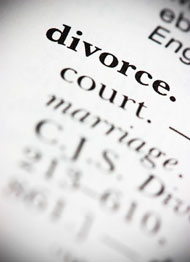
There is a rising trend in Divorce after 50. Ending a marriage is one of the largest life events that can happen in a person’s life. You may have tried to make things work, but now it’s clear, the marriage is over. What do you do next? How do you ensure you will be OK financially? How will this affect your retirement plans? Knowing your options and how the Divorce will affect you is key. The first steps are:
- Gather financial documents and know your financial picture.
Make sure you know where all your financial and legal documents are, including pension statements. Having important documents on hand in the divorce process means you avoid time and expense trying to get copies of them later. Know what assets are shared and which are exempt.
Did you know if you inherit money or receive a gift during the marriage (in most provinces) as long as it is kept in a separate account it does not have to be shared in a divorce. Once it is used to pay down the mortgage on a family home or put in a joint account, it will be considered the property of both spouses.
- Assess your credit.
Request a copy of your credit report, and correct any misinformation it contains. Good credit is the foundation of your financial future, so watch it carefully! Without credit it can be near impossible to obtain loans for any purpose, or even to manage the expenses of running your household.
- Open accounts in your own name.
You will need your own bank accounts and credit cards. It is not too soon to set these up. Use a different bank than where you currently have joint accounts, and open both savings and checking accounts in your name alone.
- Assemble a professional divorce team.
Today, financial portfolios –and the regulations that govern them –are much more complex, and you may need multiple layer of professional help to navigate all the legal and financial details.
- Be watchful.
No matter how much you may think you know someone, it is still very common for assets and/or income during divorce to be hidden –even though that’s underhanded, unethical and illegal.
It is common for one person to know more about the family finances than the other and one may not know the extent of their debts.
Resolve to get the help you need to start down the path toward your secure financial future.
For couples over 50 divorcing, generally the 2 largest assets are the house and pension. Splitting assets 50/50 may not result in the same financial picture now that is does in retirement. The goal is for both parties to come out equally and to keep income steady, so that retirement lifestyle is not negatively impacted by a divorce.
Knowing how your pension and your future monthly retirement income is affected by different asset splitting options is important. There are many ways to legally divide assets, to ensure both current and future financial needs are met.
It is a good idea to consult a financial professional as well as a lawyer if you are going through a divorce.
Your lawyer will focus on the legal issues and a planner can provide you a summary of the short, medium and long term implications of the proposed division of assets, including tax implications.
Additionally common-law relationships come with their own set of rules.
A CDFA – Certified Divorce Financial Analyst can assist you in getting the help you need to start down the path toward your secure financial future, giving you a better understanding of your financial situation.
Contact Heather for a no obligation review of your financial situation.

